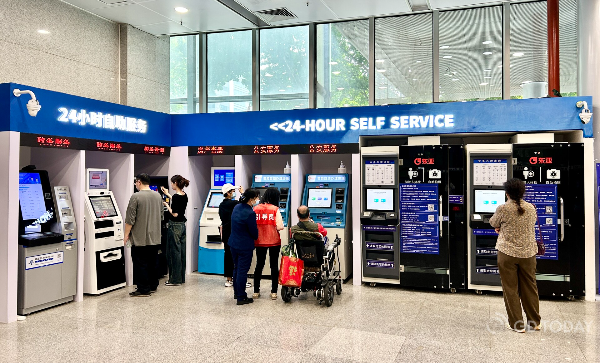
24-hour self-service kiosks at the Guangzhou Municipal Government Service Center in Guangdong Province, China.
Guangzhou has introduced new regulations to cut red tape, digitize public services, and enhance responsiveness for residents and enterprises, according to a media briefing held on April 10 by the Standing Committee of the Guangzhou Municipal People's Congress.
The Guangzhou Municipal Regulations on Government Services (《廣州市政務(wù)服務(wù)條例》), approved by the standing committee of the municipal legislative body and authorized by the Standing Committee of the Guangdong Provincial People's Congress, will take effect on May 1, 2025.
This new framework marks a significant step in the city's efforts to improve administrative efficiency and transparency, addressing long-standing concerns over bureaucratic hurdles and aiming to create a more accessible, business-friendly environment.
Empowering businesses through streamlined services
At the heart of the reform is a bid to simplify processes for companies, from initial registration to securing operational permits.
Lin Xin, a deputy to the Guangzhou Municipal People's Congress, highlighted challenges faced by businesses during her legislative duties.
"Previously, entrepreneurs had to submit the same materials to multiple departments. Standards varied across districts, leading to repeated visits and higher operational costs," she said. "The new regulations propose integrated service windows and a parallel approval mechanism, so companies can complete all steps in one place."
The new mechanism also allows for incomplete but non-critical application materials to be temporarily waived, benefiting small and micro enterprises especially.
Beyond startups, the regulations introduce innovations such as a "difficult-case window" ("辦不成事"反映窗口) to address issues that fall through bureaucratic cracks. This is expected to resolve long-standing inefficiencies.
The private sector has welcomed the move. A private enterprise employee said the reform could "substantially lower compliance costs and attract more talent and resources to Guangzhou."
Smarter, fairer, and more inclusive governance
The regulations also aim to bridge service gaps for ordinary citizens. Zhou Xiaorong, another local legislator involved in the drafting process, emphasized the human-centric design of the law.
"Long queues during peak hours, unmet urgent requests, and unclear policy eligibility were common complaints. Now, wait times can be predicted, and emergency services during weekends and holidays are available," she said.
Digital transformation plays a pivotal role. In January, Guangzhou became the first city in China to localize DeepSeek for government use. Recently, AI-powered services were launched to provide intelligent policy consultations, application guidance, and real-time Q&A.
Importantly, the regulations ensure that vulnerable populations are not overlooked. They mandate accessible offline service channels and tailored support for the elderly and disabled.
These regulations are more than just administrative measures—they reflect a broader shift in governance philosophy.
According to Liu Tao, a member of the Standing Committee of the Guangdong Provincial People's Congress, the reform signifies Guangzhou's move from a "government-centered" to a "people-centered" approach. "These solutions are designed around what citizens care about. Services are becoming more humane and responsive," he said.
The regulations also strengthen oversight mechanisms. They empower supervisory departments to assess and correct underperformance, require service hotlines like 12345 to operate 24/7, and mandate regular reviews by the local legislature to ensure compliance.
"The reform isn't just about convenience. It's about upgrading from reactive service to proactive empowerment," Zhou said.
All materials marked with "source: English.gz.gov.cn" on this website (including but not limited to text, photographs, audio and video materials) are the copyrighted property of Guangzhou International (the official website of Guangzhou Municipality). Without prior authorization from Guangzhou International, any media, website, organization or individual shall not transmit, interlink, distribute or republish such materials in any form. Any media and website authorized to republish such materials shall mark them with "source: Guangzhou International (English.gz.gov.cn)". Infringement of these copyrights will result in legal action.
